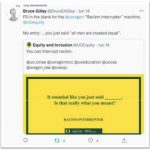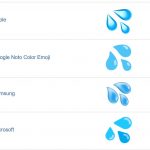
University-Operated Twitter Account is a Limited Public Forum–Gilley v. Stabin
This lawsuit involves the @UOEquity Twitter account, operated by the University of Oregon’s Division of Equity and Inclusion. During the relevant time period, tova stabin (who styles her name in lowercase) was the communications manager running the account. The account…

What Does the “Water” Emoji Mean? Perhaps Not What You Think–US v Swanagan
[Just a reminder that there are no “off-limits” topics in Internet Law. So yes, this post is going to go there.] Law enforcement took down a methamphetamine ring in Kentucky. Based in part on Facebook messages between two defendants that…

If You Ask Your Friend to Take Your Photo Using Your Camera, Who Owns the Copyright?–Shah v. NYP
Vivek Shah attended several Hollywood parties. While there, he preset the settings on his phone camera (including shutter speed, white balance, ISO, metering type, and exposure value) and asked friends or bystanders to use his phone to take photos of…

2022 Internet Law Year-in-Review
Three dynamics combined to make 2022 a brutal year for Internet Law. First, the techlash is taking its toll. There is widespread belief that the major incumbents are too big, too rich, and too capricious to avoid pervasive government control….

Section 230 Applies to NY Publicity Rights Claim–Ratermann v. Pierre Fabre
Patty Ratermann is a model. She signed a license with QuickFrame to use her likeness only on Instagram. Somehow (the court skips over exactly how), Pierre Fabre used her likeness to promote its Avène skincare products on its website, on…

Fourth Circuit’s 230 Meltdown Gives Plaintiffs False Hope–Divino v. Google
Last year, in Henderson v. Source for Public Data, the Fourth Circuit issued a MAGAlicious Section 230 opinion that seemingly trashed 25 years of Fourth Circuit precedent. It was immediately obvious that plaintiffs would widely cite the ruling. However, so…

“Stop the Steal” Rally Attendee’s Defamation Claim Fails–Chad Burmeister v. Saldich
Chad Burmeister (no Chad jokes, please…no Karen jokes, either) attended the DC “Stop the Steal” rally on January 6, 2021. One of his LinkedIn contacts noisily dropped him as a contact, saying: Normally I’d stay away from political commentary on…

Section 230 Protects Services That Permit Anonymous Third-Party Posts–Bride v. Snap
This case involves two “anonymous messaging” apps, Yolo and LMK. Both allegedly target teens audiences. “Plaintiffs allege they received harassing messages in response to their benign posts on Defendants’ applications and did not receive comparable messages on other platforms in…

My Amicus Brief in Gonzalez v. Google
Internet Law is in play at the U.S. Supreme Court, as they will likely hear at least four cases this term. (A possible fifth is the 303 Creative case). The four cases: Gonzalez v. Google, over whether Section 230 applies…
Man Convicted for Asking for CSAM on Mom Blogs–US v. Moran
Moran made several comments on generally-wholesome “mom blogs” asking moms to have their daughters create CSAM to his specifications. Among other crimes, he was prosecuted for attempted CSAM production. His defense was basically that it was so stupid to ask…
